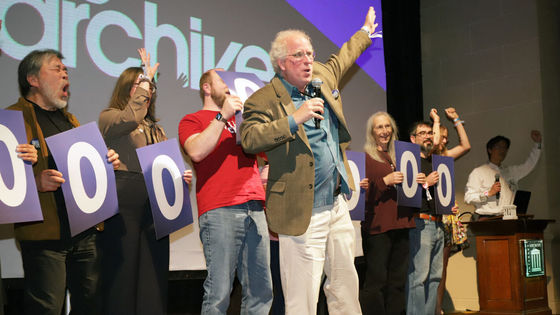Internet Archive founder says: 'We survived, but our library was destroyed'

The Internet Archive, which collects and preserves vast amounts of online content, has reported that the number of web pages stored by October 2025
Internet Archive's legal fights are over, but its founder mourns what was lost - Ars Technica
https://arstechnica.com/tech-policy/2025/11/the-internet-archive-survived-major-copyright-losses-whats-next/
'The world became stupider' when Internet Archive's Open Library was hit by a lawsuit: 'We survived, but it wiped out the library' | PC Gamer
https://www.pcgamer.com/hardware/the-world-became-stupider-when-internet-archives-open-library-was-hit-by-a-lawsuit-we-survived-but-it-wiped-out-the-library/
As the Internet Archive surpassed one trillion preserved web pages, it held various celebratory events. At the event, 'The Web We've Built,' held on October 22, 2025, participants looked back on early websites using pages preserved by the Internet Archive and discussed the Internet Archive's vision for the future. Luca Messala, a humanities researcher at Stanford University, spoke at the event, highlighting the importance of the Internet Archive, saying, 'Preserving web pages is important because the past always shapes the present moment. The past teaches us that the present does not have to be the same as it is now.'

The San Francisco City Council has also recognized the organization's 'nearly 30 years of San Francisco-based operations and its contribution to preserving over 1 trillion web pages,' and has

During the 'The Web We've Built' talk and the event marking Internet Archive Day, Brewster Kahle, founder of the Internet Archive, spoke about the organization's progress and its 'next phase,' which he said will explore ways to preserve 'digital-built experiences' that people have in digital spaces, such as 3D environments and online games.

In March 2020, the Internet Archive launched the National Emergency Library, a digital library with 1.4 million books available for reading, in response to the increased time people spent at home due to the COVID-19 pandemic. The Internet Archive operated the National Emergency Library under the view that it was fair use, but publishers sued for copyright infringement. As a result, the Internet Archive lost the case, and 500,000 books were removed from the library's lending list.
Internet Archive removes 500,000 books from lending list after publisher wins lawsuit - GIGAZINE

Additionally, the Internet Archive is running the ' Great 78 ' project, which digitizes hundreds of thousands of records and stores and makes them available online. However, in April 2025, it was reported that music labels were suing the Internet Archive for $693 million (approximately 99 billion yen) in damages, claiming that this was serious copyright infringement. The case was settled in October 2025 under undisclosed terms.
Internet Archive vs. Record Company Lawsuit Expands to Approximately 100 Billion Yen in Damages, Meanwhile, Moves to Settle - GIGAZINE

While the Internet Archive has faced various other lawsuits, a spokesperson for the organization said that as of October 2025, it was not facing any major lawsuits or threats to its collections. Kahle commented, 'We survived, but it wiped out (part of) our library.' With the litigation risks now subsided, the Internet Archive is currently in a 'phase of rebuilding and redefining.'
The National Emergency Library project's goal wasn't to block e-book sales, but to make it easier for researchers and others to reference e-books by allowing Wikipedia to link to scanned images of books. Publishers, however, refused, prompting Kahle to criticize the project, saying, 'These multi-billion dollar media conglomerates have demonstrated their vested interest in controlling the flow of information. They've succeeded in preventing Wikipedia readers from accessing books.' Copyright attorney and librarian Kyle Courtney also pointed out the significance of the National Emergency Library, saying, 'We don't want libraries to become Hulu or Netflix; we want them to fulfill their role in preserving culture and providing equal access to knowledge. Remote access is beneficial for seniors, people with disabilities, rural residents, and those working overseas.'
Regarding the series of lawsuits, Kale said, 'The Internet Archive's legal battle is not with creators or publishers, but with major media companies that are not satisfied with the restrictions imposed by copyright. They want more than what copyright allows. I think these companies wanted the Wayback Machine to end. But it survived and proved to be an unparalleled and useful resource.'

'We're just trying to be a library in the traditional sense, but that's becoming more difficult because of the limitations of fair use,' Kale said. Brandon Butler, a copyright lawyer and executive director of Re:Create, a coalition dedicated to balanced copyright and a free and open internet, said the Internet Archive is one example of a number of other cases in which libraries have faced significant legal battles, suggesting that fear of costly lawsuits from publishers could slow digitization efforts for preservation. Butler said, 'These cases highlight a societal issue: not just the pros and cons of copyright, but who gets to preserve the cultural record.'
However, the lawsuits haven't deterred the Internet Archive from its commitment to its project. The Internet Archive plans to expand its 'Democracies Library,' a 'free and open online collection of government research and publications from around the world,' and is expected to link it to Wikipedia to make it easier for researchers to access the information.
However, one major concern is the rapid development of AI. AI companies are facing numerous lawsuits from creators and publishers, and companies are increasingly exerting control over information. Kale points out that it's unclear whether archive projects aimed at preserving public records can withstand attacks from multiple angles.
Kahle proposes 'restructuring' copyright law to 'create a game with many winners'—one in which authors, publishers, and booksellers are adequately compensated, while the mission of libraries is respected and progress is fostered. 'We want everyone to be readers, and that means we need many publishers, many distributors, many booksellers, and many libraries,' Kahle said.
Related Posts:
in Web Service, Posted by log1e_dh






